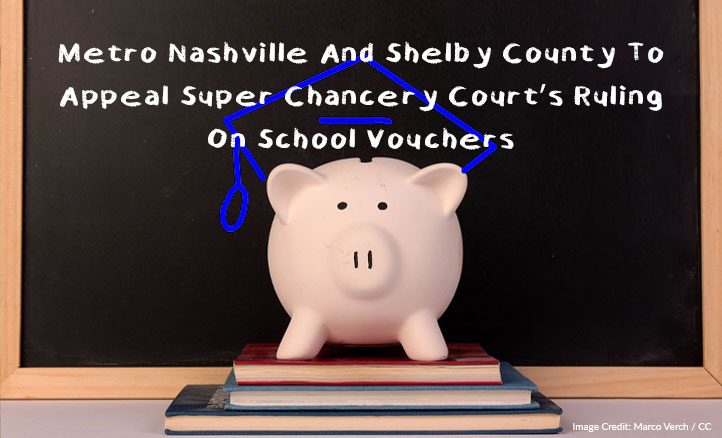Image Credit: Marco Verch / CC
The Tennessee Conservative [By Jason Vaughn] –
In November of 2022, after court battles dating back to 2019, a three-judge “super-chancery” court decided that Tennessee’s school voucher program was good to proceed without any further court intervention.
However, late last month, plaintiffs behind two of the lawsuits challenging the voucher plan notified the Tennessee Court of Appeals that they will be appealing the latest ruling.

The Tennessee voucher program, which establishes Education Savings Accounts for families in Shelby County and Nashville area schools uses publicly-funded vouchers to help cover the cost of private school tuition and fees.
The three-judge super-chancery court ruled in November that the controversy surrounding the voucher system is “merely a disagreement of public policy and inappropriate for judicial decision.”
Metro Nashville and Shelby County school districts argued that they would be harmed by the program because of a loss of public funding, but the panel ruled that argument was unfounded because the program is set up to be funded by the state for the first three years of the pilot program, and not local school districts.
According to the state, the program will give students in low-performing schools an opportunity to attend a private school in hopes of gaining a better education.
School districts continue to claim that the program will be counterproductive because they believe taking funding away from already underperforming schools will leave them in worse shape than they are currently in. They also argue that districts who performed even worse than Nashville or Memphis are not being targeted by the program.
However, the majority of the Super-Chancery was unmoved. “We are unpersuaded,” the majority wrote. “As County Plaintiffs themselves state, their money ‘is the heart and soul of the ESA Act’ and, thus, this dispute. Any disparate treatment between County Plaintiffs and the other counties of this state must come down to a disparate treatment in funding. But the loss of money has already been remedied by the ESA Act itself.”
Davidson County Chancellor Anne Martin, who served as the panel’s chief judge, dissented partially from the other two panel members, Judges Tammy M. Harrington and Valerie L. Smith.
The plaintiffs of the current appeal are keying on Martin’s dissenting opinion in which she said that the state has a constitutional obligation to maintain a free public school system that provides equal educational opportunities. Martin said the plaintiffs’ allegations of discriminatory treatment and unequal funding were sufficient concerns to let the case proceed, Chalkbeat Tennessee reports.
Over the summer, the Tennessee Supreme Court lifted an injunction on the program and the state was able to move forward with the initiative and begin accepting applications from families in the Metro Nashville and Shelby County school districts.
By December 22nd, 236 applications from students in Metro Nashville Schools and 323 applications from students in Memphis-Shelby County Schools had been approved with 510 applications ruled as ineligible, according to a spokesperson from the Tennessee Department of Education.

Some GOP members of the Tennessee General Assembly introduced legislation in early December to expand the ESA program to children in other struggling schools.
Senate Bill 0012 (SB0012), as introduced, expands the eligibility criteria for an education savings account to include students zoned to attend a school in an LEA with at least five schools, instead of at least 10, identified as being in the bottom 10 percent of schools in 2017 and identified as priority schools in the 2015, 2018, and 2021 priority school cycles. – Amends TCA Title 49, Chapter 6.
Senate Bill 0012 has prime co-sponsors of Senator Jon Lundberg (R-Bristol-District 4) and Senator Bo Watson (R-Hixson-District 11). Although filed for introduction on December 6th, the bill still does not have a sponsor in the House upon publication of this article.
At current, it is only known for certain that the legislation, if passed, would expand the ESA program to Hamilton County.
After Senator Todd Gardenhire (R-Chattanooga-District 12) requested his help in passing the legislation, House Education Administration Committee Chairman Mark White (R-Memphis-District 83) told the Tennessee Lookout that he plans to sponsor the House version of the bill.
Patsy Hazlewood (R-Signal Mountain-District 27), House Finance, Ways and Means Committeewoman also confirmed that she would co-sponsor the legislation, even though she had previously requested that Hamilton County be removed before the House narrowly passed a voucher bill in 2019.
“Now that the TISA formula is in place ensuring that the money follows the child, it only seems fair that Hamilton County students who are zoned for these failing schools should have a chance at a higher quality education as do those in Shelby and Davidson,” she said.
Gardenhire said his legislation, Senate Bill 12, is designed for Hamilton County. It would expand the eligibility to include students zoned to a school district with at least five schools – not 10 as written for Metro Nashville and Shelby – in the bottom 10% of the state’s schools in 2017 and identified as priority schools (in the bottom 5%) in 2015, 2018 and 2021.
The Knox and Madison school districts could become voucher systems if the cumulative number of schools for those categories are taken into account. In 2019, those were two of three removed from the bill in order to pass it in the House and the Senate.
Sen. Richard Briggs (R-Knoxville-District 7) and Rep. Gloria Johnson (D-Knoxville-District 90) both oppose vouchers in Knox County. Senator Ed Jackson (R-Jackson-District 25) would not commit on his stance for either supporting or not supporting the expansion of vouchers for the Jackson-Madison County School District.
House Speaker Cameron Sexton (R-Crossville-District 25) who voted against the voucher bill at least twice in 2019, was non-committal when asked about expansion to Hamilton and potentially Knox and Madison counties. However, Lt. Gov. Randy McNally (R-Oak Ridge-District 5) seems to be more favorable toward the expansion of vouchers.


About the Author: Jason Vaughn, Media Coordinator for The Tennessee Conservative ~ Jason previously worked for a legacy publishing company based in Crossville, TN in a variety of roles through his career. Most recently, he served as Deputy Director for their flagship publication. Prior, he was a freelance journalist writing articles that appeared in the Herald Citizen, the Crossville Chronicle and The Oracle among others. He graduated from Tennessee Technological University with a Bachelor’s in English-Journalism, with minors in Broadcast Journalism and History. Contact Jason at news@TennesseeConservativeNews.com



One Response
Our schools have been underperforming for years and still beg for more money. I think vouchers will be a wakeup notice. The unions and the inability of parents to have a say in the curriculum has destroyed our educational system. The educators who call themselves “woke” need to go back to be and rethink their priorities. There’s nothing inherently wrong with patriotism or recognizing citizen responsibility. Get back to basics and things will improve dramatically. Children need a sound education in the basics of living before they spread their wings and fly.
‘